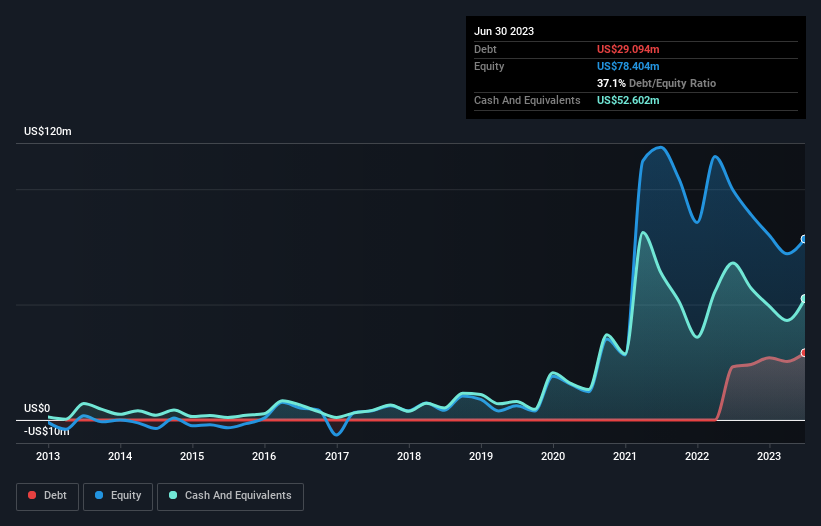
Some say volatility, rather than debt, is the best way to think about risk as an investor, but Warren Buffett famously said that 'Volatility is far from synonymous with risk.' It's only natural to consider a company's balance sheet when you examine how risky it is, since debt is often involved when a business collapses. Importantly, DarioHealth Corp. (NASDAQ:DRIO) does carry debt. But should shareholders be worried about its use of debt?
When Is Debt A Problem?
Debt assists a business until the business has trouble paying it off, either with new capital or with free cash flow. Ultimately, if the company can't fulfill its legal obligations to repay debt, shareholders could walk away with nothing. However, a more frequent (but still costly) occurrence is where a company must issue shares at bargain-basement prices, permanently diluting shareholders, just to shore up its balance sheet. Having said that, the most common situation is where a company manages its debt reasonably well - and to its own advantage. When we think about a company's use of debt, we first look at cash and debt together.
Check out our latest analysis for DarioHealth
What Is DarioHealth's Debt?
As you can see below, at the end of June 2023, DarioHealth had US$29.1m of debt, up from US$23.1m a year ago. Click the image for more detail. But on the other hand it also has US$52.6m in cash, leading to a US$23.5m net cash position.

How Strong Is DarioHealth's Balance Sheet?
The latest balance sheet data shows that DarioHealth had liabilities of US$8.08m due within a year, and liabilities of US$30.7m falling due after that. Offsetting this, it had US$52.6m in cash and US$6.63m in receivables that were due within 12 months. So it actually has US$20.5m more liquid assets than total liabilities.
This excess liquidity suggests that DarioHealth is taking a careful approach to debt. Due to its strong net asset position, it is not likely to face issues with its lenders. Simply put, the fact that DarioHealth has more cash than debt is arguably a good indication that it can manage its debt safely. The balance sheet is clearly the area to focus on when you are analysing debt. But it is future earnings, more than anything, that will determine DarioHealth's ability to maintain a healthy balance sheet going forward. So if you want to see what the professionals think, you might find this free report on analyst profit forecasts to be interesting.
In the last year DarioHealth wasn't profitable at an EBIT level, but managed to grow its revenue by 2.8%, to US$27m. We usually like to see faster growth from unprofitable companies, but each to their own.
So How Risky Is DarioHealth?
We have no doubt that loss making companies are, in general, riskier than profitable ones. And we do note that DarioHealth had an earnings before interest and tax (EBIT) loss, over the last year. Indeed, in that time it burnt through US$33m of cash and made a loss of US$57m. With only US$23.5m on the balance sheet, it would appear that its going to need to raise capital again soon. Overall, its balance sheet doesn't seem overly risky, at the moment, but we're always cautious until we see the positive free cash flow. The balance sheet is clearly the area to focus on when you are analysing debt. However, not all investment risk resides within the balance sheet - far from it. For instance, we've identified 3 warning signs for DarioHealth that you should be aware of.
When all is said and done, sometimes its easier to focus on companies that don't even need debt. Readers can access a list of growth stocks with zero net debt 100% free, right now.
If you're looking to trade DarioHealth, open an account with the lowest-cost platform trusted by professionals, Interactive Brokers.
With clients in over 200 countries and territories, and access to 160 markets, IBKR lets you trade stocks, options, futures, forex, bonds and funds from a single integrated account.
Enjoy no hidden fees, no account minimums, and FX conversion rates as low as 0.03%, far better than what most brokers offer.
Sponsored ContentNew: Manage All Your Stock Portfolios in One Place
We've created the ultimate portfolio companion for stock investors, and it's free.
• Connect an unlimited number of Portfolios and see your total in one currency
• Be alerted to new Warning Signs or Risks via email or mobile
• Track the Fair Value of your stocks
Have feedback on this article? Concerned about the content? Get in touch with us directly. Alternatively, email editorial-team (at) simplywallst.com.
This article by Simply Wall St is general in nature. We provide commentary based on historical data and analyst forecasts only using an unbiased methodology and our articles are not intended to be financial advice. It does not constitute a recommendation to buy or sell any stock, and does not take account of your objectives, or your financial situation. We aim to bring you long-term focused analysis driven by fundamental data. Note that our analysis may not factor in the latest price-sensitive company announcements or qualitative material. Simply Wall St has no position in any stocks mentioned.
About NasdaqCM:DRIO
DarioHealth
Operates as a digital health company in the United States, Canada, the European Union, Australia, and New Zealand.
Excellent balance sheet slight.
Similar Companies
Market Insights
Community Narratives




